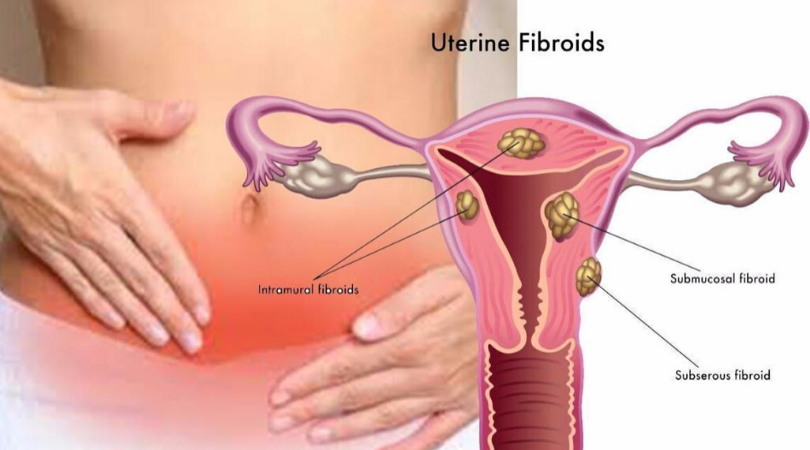
Uterine Fibroids are the common tumors of the uterus and are the most frequent reason for a hysterectomy. Fibroids grow from the muscular wall of the uterus. Many women over the age of 35 have fibroids but usually have no symptoms. By the age of 50 years, approximately 60% of the women have fibroids
In some women, however, fibroids may cause heavy bleeding, pelvic discomfort, and pain and occasionally exert pressure on other organs. These symptoms may require treatment.
Treatment may take the form of medication to control pain and bleeding, hormone therapy to shrink the tumor, surgery to remove the tumor, or occasionally a hysterectomy.
The symptomatic woman near menopause does not require treatment as fibroids will shrink at menopause.
Are there different types of fibroids?
A fibroid can be very small from mm in size to huge. Fibroids are also known as myoma or leiomyoma. A woman may have one fibroid or many
- Submucosal fibroids grow just beneath the inner lining of the uterus, they often cause more bleeding problems than other types of fibroids because they can crowd the uterine space. They may cause symptoms of heavy bleeding even when they are very small
- Submucosal fibroids grow just beneath the inner lining of the uterus, they often cause more bleeding problems than other types of fibroids because they can crowd the uterine space. They may cause symptoms of heavy bleeding even when they are very small
- Intramural fibroids grow in the wall of the uterus I and are the most common type of fibroid.
What Causes Fibroids?
- Fibroids may be genetic Female hormones, estrogen and progesterone, cause fibroids to grow.
- Fibroids grow rapidly during pregnancy when hormone levels are high and shrink when anti-hormone medicine is used. Fibroids also stop growing or shrink once a woman reaches menopause.
What are the symptoms of fibroids?
For most women, fibroids do not cause symptoms. At least 25% of women who have uterine fibroids do have symptoms.
Symptoms will depend on the location and size of the fibroids.
Symptoms of fibroids may include:
- Heavy bleeding between or during your periods that includes blood clots especially with submucosal fibroids
- Pain in the pelvis or lower back
- Increased menstrual cramping and longer periods especially with submucosal fibroids
- Pain during intercourse
- Pressure or fullness in your lower abdomen
- Swelling or enlargement of the abdomen
How are fibroids diagnosed?
- Ultrasound: The easiest method to diagnose a fibroid. A transvaginal ultrasound, in which the ultrasound probe is inserted into the vagina, may provide clearer pictures since it’s closer to the uterus during this procedure.
- MRI: Provides a clearer image of the fibroids and their extent near soft tissues.
- Hysteroscopy: is a procedure in which a small telescope with a light source, is inserted through the vaginal opening of the patient. This procedure is generally used in the case of submucosal fibroid i.e. when the fibroid is present in the womb.
- Laparoscopy: During laparoscopy, the surgeon makes a small incision. These incisions are made near the patient’s abdomen. The laparoscope which is a small telescope with a light source and camera at one end is passed through the incisions so that the doctor can examine the tissues & organs inside the abdomen. During this procedure, general anesthesia is used. Such type of procedure can be used to look for fibroids outside your womb or fibroids in the layer of muscle surrounding the womb. The former case is known as subserosal fibroids and the latter is known as intramural fibroids. It is also a theoretical procedure where fibroids can be removed
Fibroid Treatment Depends On
- Extent of disease
- The severity of symptoms like pain.
- Desire for childbearing
Medical Fibroid Treatment
Fibroid treatment is not always necessary especially if there are no symptoms or they do not affect your everyday activities.
Asymptomatic or accidentally discovered fibroids do not require any treatment.
Uterine Fibroids in women who are at perimenopausal women are left alone as fibroids shrink at menopause.
Fibroid Treatment modalities include:-
-
- OTC anti-inflammatory pain relievers, such as ibuprofen to reduce pain
- Hormonal Contraceptives – To regulate the menstrual cycle and correct hormonal issues.
- An intrauterine device (IUD) that releases the hormone progestin
GnRH antagonists, also help to shrink fibroids. They work by stopping your body from producing follicle-stimulating hormone (FSH) and luteinizing hormone (LH).
Surgical Fibroid Treatment
If medication is ineffective & the symptoms do not recede in severity thus surgery should be considered. Hysterectomy & Laparoscopy the two main procedures are discussed below.
- Hysterectomy ( laparoscopic, open, vaginal ) Preferred option for women above 45 years. A hysterectomy should be considered if you have large fibroids or severe bleeding and you don’t wish to have any more children since it involves removal of the womb. It’s an effective way of preventing fibroids from coming back. The side effects of this procedure can include early menopause.
- Myomectomy: If the patient is less than 40 yrs wishes to have children then the suitable option would be myomectomy. It is a surgery where the fibroids are removed from the wall of the womb. But it is important to note that myomectomy may not be the answer to all types of fibroids. Your gynecologist can evaluate the suitability based on the size, position & number of fibroids. You will require to spend a few days in the hospital to recover after the surgery.
- Uterine Artery Embolization: In this procedure, small particles are injected into the uterus in order to cut off the fibroids’ blood supply.
What can be expected in the long term?
Your prognosis will depend on the size and location of your fibroids. Fibroids may not need treatment if they’re small or don’t produce symptoms.
Fibroids are very common and can be easily managed with modern medical advancement.
Dr. Deepika Doshi at Dhanvantari hospital provides specialized fibroid treatment with a holistic approach. To Book an appointment: click here
